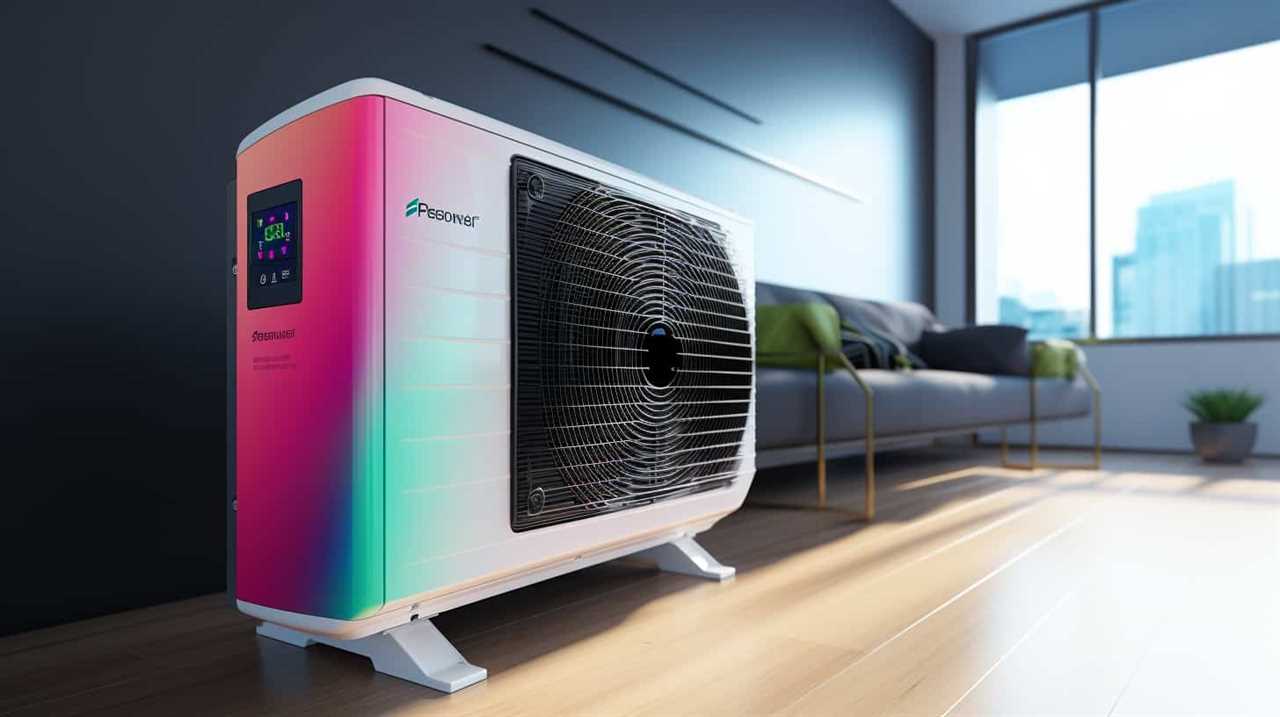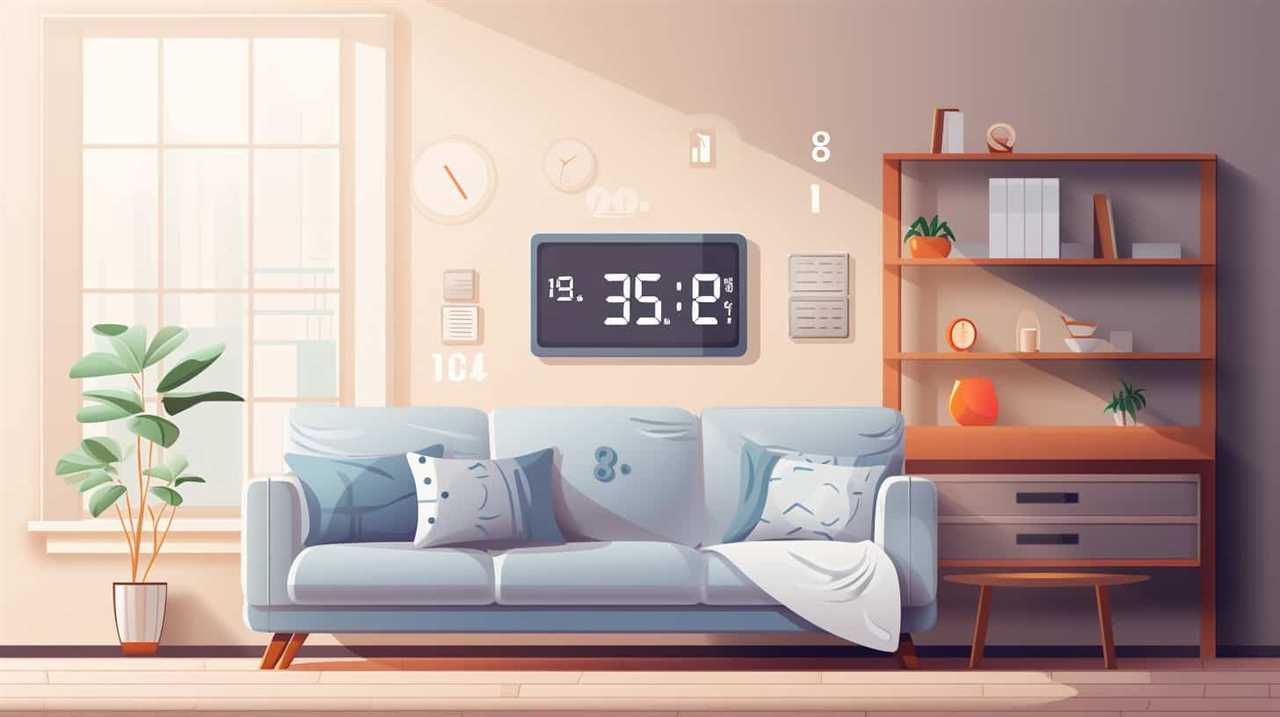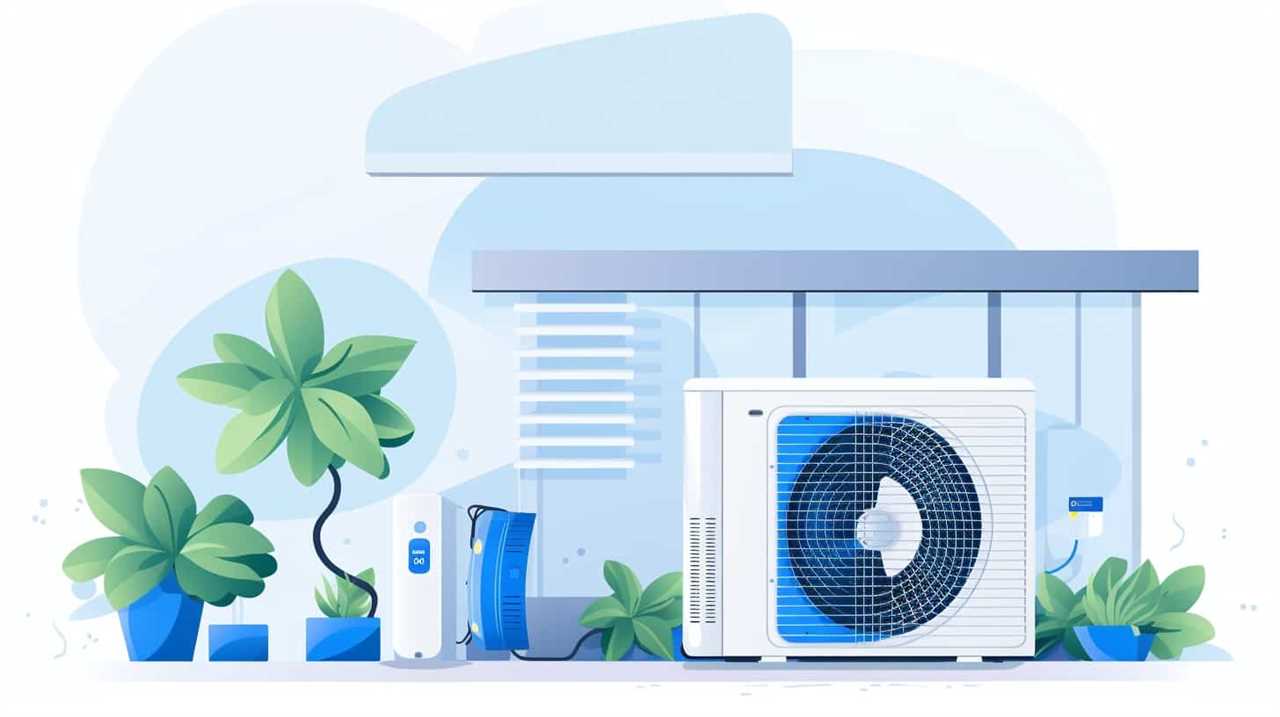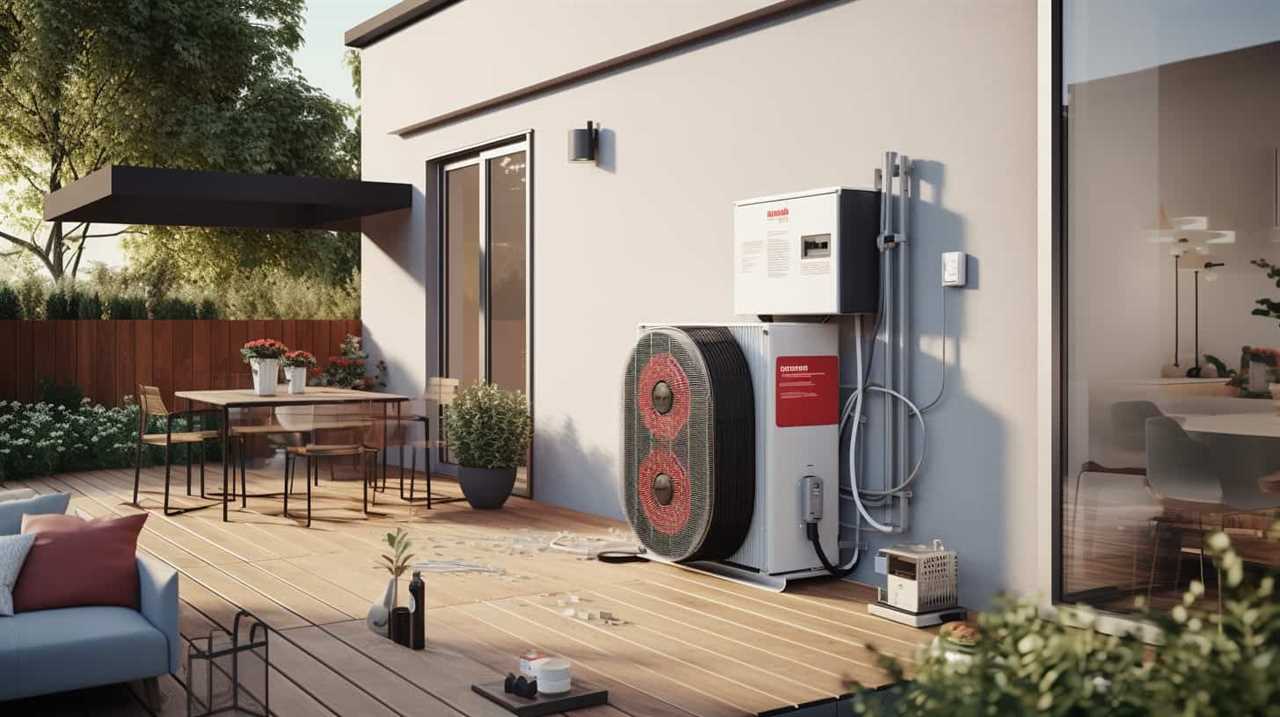Are you tired of paying high energy bills and dealing with inefficient heat pump performance? Don’t worry, we’ve got you covered. In this article, we will provide you with proven strategies to improve the efficiency ratings of your heat pump.
By understanding the importance of energy efficiency ratings and implementing regular maintenance practices, you can enjoy a more comfortable home while saving money on your energy bills.
Upgrade key components and utilize smart thermostat technology to maximize your heat pump’s energy efficiency.
Let’s dive in and start saving!

Key Takeaways
- High efficiency ratings result in significant heat pump energy savings and lower energy bills
- Regular maintenance practices, such as scheduling professional maintenance and cleaning/replacing air filters, maximize efficiency ratings
- Upgrading key components, such as variable-speed motors and enhanced coils, improves heat pump efficiency and reduces energy consumption
- Utilizing smart thermostat technology, including remote monitoring and integration with smart home systems, maximizes energy efficiency ratings for heat pumps
Understanding the Importance of Heat Pump Energy Efficiency Ratings
One of the most crucial factors to consider when evaluating heat pump performance is the energy efficiency rating. The energy efficiency rating measures how effectively a heat pump converts energy into heat or cool air.
Understanding the importance of heat pump energy efficiency ratings is essential for homeowners who desire both comfort and savings. High efficiency ratings result in significant heat pump energy savings, leading to lower energy bills. A heat pump with a high efficiency rating uses less electricity to generate the same amount of heat or cool air as a lower-rated unit. This not only reduces energy consumption but also minimizes carbon emissions, benefiting the environment.
Additionally, high efficiency ratings often indicate superior performance and longevity, ensuring reliable and efficient operation for years to come. By prioritizing heat pump energy efficiency ratings, homeowners can experience increased comfort, lower energy bills, and a reduced environmental impact.
Identifying Common Factors Affecting Heat Pump Efficiency Ratings
We can improve heat pump efficiency ratings by identifying and addressing common factors that affect their performance. To ensure optimal performance, it’s important to focus on improving insulation and optimizing airflow.

Here are some key factors to consider:
-
Insulation: Proper insulation is crucial to prevent heat loss or gain. By improving insulation in your home, you can minimize the workload on your heat pump and increase its efficiency.
-
Airflow: Proper airflow is essential for heat transfer and distribution. Ensuring that air filters are clean and unobstructed, and that ductwork is properly sealed and insulated, can significantly improve the efficiency of your heat pump.
-
Thermostat settings: Setting your thermostat at an appropriate temperature can help optimize the performance of your heat pump and reduce energy consumption.

-
Sizing: Ensuring that your heat pump is properly sized for your home’s heating and cooling needs is essential for achieving optimal efficiency.
By addressing these common factors, you can improve the efficiency of your heat pump and reduce energy consumption.
Now, let’s explore how implementing regular maintenance practices can further boost efficiency ratings.
Implementing Regular Maintenance Practices to Boost Efficiency Ratings
To maximize efficiency ratings, we should regularly implement maintenance practices.

As heat pump owners, there are several energy-saving tips we can follow to ensure our units are operating at peak performance.
First and foremost, scheduling professional heat pump maintenance on a regular basis is crucial. A qualified technician can inspect and clean the various components of the heat pump, including the coils, filters, and fans. This not only helps improve efficiency but also extends the lifespan of the unit.
Additionally, it’s important to regularly clean or replace air filters to ensure proper airflow and prevent dust and debris from accumulating.
Properly insulating the ductwork and sealing any air leaks can further enhance efficiency by minimizing heat loss.

Upgrading Key Components for Improved Heat Pump Efficiency Ratings
To improve heat pump efficiency ratings, we can upgrade key components and achieve better performance. Here are some heat pump component upgrades that can help optimize energy consumption:
-
Variable-speed motors: Upgrading to variable-speed motors allows the heat pump to adjust its speed based on the heating or cooling demand, resulting in better energy efficiency and more precise temperature control.
-
Enhanced coils: Upgrading to enhanced coils, such as microchannel coils or fin-and-tube coils with advanced coatings, improves heat transfer efficiency and reduces energy consumption.
-
Smart thermostats: Installing a smart thermostat enables precise temperature control, scheduling, and remote access, helping to optimize energy usage and increase efficiency.

-
Improved insulation: Upgrading insulation around the heat pump and its ductwork reduces heat loss or gain, enabling the heat pump to operate more efficiently and maintain desired indoor temperatures.
Utilizing Smart Thermostat Technology to Maximize Energy Efficiency Ratings
By utilizing smart thermostat technology, we can maximize energy efficiency ratings for heat pumps. Smart thermostats offer advanced features that enhance heat pump performance and optimize energy savings. One key benefit is remote monitoring, which allows users to access and control their heat pumps from anywhere using a smartphone or computer. This enables real-time adjustments and ensures the heat pump operates at the most efficient level. Additionally, smart thermostats play a crucial role in optimizing temperature settings. They can learn the user’s preferences and automatically adjust the temperature based on occupancy and time of day, reducing energy waste. To illustrate the impact of smart thermostats on energy efficiency ratings, let’s take a look at the following table:
| Smart Thermostat Feature | Energy Efficiency Benefits |
|---|---|
| Remote Monitoring | Enhances heat pump efficiency through smart technology |
| Optimizing Temperature Settings | Maximizes energy savings by adjusting temperature based on occupancy and time of day |
With these smart thermostat features, heat pumps can achieve higher energy efficiency ratings, resulting in reduced energy consumption and lower utility bills.
Frequently Asked Questions
How Do Heat Pump Energy Efficiency Ratings Compare to Other Types of Heating Systems?
Comparing efficiency ratings, heat pumps are more energy efficient than other heating systems. They offer significant energy savings potential and are cost-effective in the long run.

Are There Any Government Incentives or Rebates Available for Upgrading to a More Efficient Heat Pump?
Yes, there are government incentives and rebates available for upgrading to a more efficient heat pump. These incentives can help offset the cost of heat pump upgrades and make them more affordable for homeowners.
Can Regular Maintenance Practices Really Make a Significant Difference in Boosting Heat Pump Efficiency Ratings?
Regular maintenance practices have a significant impact on heat pump efficiency ratings. By ensuring proper cleaning, lubrication, and inspections, we can optimize performance and reduce energy consumption, ultimately saving money on utility bills.
What Are the Key Components of a Heat Pump That Should Be Upgraded for Improved Efficiency?
When upgrading heat pump components for improved efficiency, it’s important to focus on key areas such as the compressor, fan, and coils. These efficiency upgrades can significantly enhance the overall performance of the heat pump system.
How Does Utilizing Smart Thermostat Technology Impact Heat Pump Energy Efficiency Ratings?
Using smart thermostat technology significantly impacts heat pump energy efficiency ratings by optimizing temperature control and scheduling. This leads to energy savings and improved comfort, making it a valuable upgrade for boosting efficiency.

Conclusion
In conclusion, by understanding the importance of heat pump energy efficiency ratings and implementing regular maintenance practices, we can boost efficiency and maximize energy savings.
Upgrading key components and utilizing smart thermostat technology further enhances the efficiency of heat pumps.
Just like a skilled conductor leading a symphony, these proven strategies harmonize together to create a symphony of energy efficiency, reducing our carbon footprint and improving our overall comfort and well-being.









